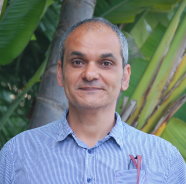Dr. Mihai Surdu
Contact
mihai.surdu@ucf.uni-freiburg.de
Research Interests
Science and Technology Studies (STS), Romani Studies, History and Philosophy of Science, Policy Analysis, Sociology of Education
About me
I am a sociologist working on Roma related topics as researcher, policy analyst, consultant, and project evaluator for more than 20 years.
My academic work addresses critically the politics of knowledge production about Roma with a focus on data collection procedures, processes of stigmatization and minoritization, and social consequences resulting from ethnic categorization in various fields. My book Those Who Count: Expert Practices of Roma Classification (published in 2015 by CEU press) analyses policy surveys, state-led population censuses, as well as academic and scientific research for the ways in which the Roma category is employed in the expert discourse.
Fellowships and research projects
My scholarly work was supported by the Deutsche Forschungsgemeinschaft (DFG): during 2016-2019 I have been Research Associate (Wissenschaftlicher Mitarbeiter) in the project "The Genetic Construction of Roma Groupness and its Interdisciplinary Entanglements", led by Prof. Dr. Veronika Lipphardt. The project scrutinizes the place of genetics in the overall discourse about Roma and discusses some of the claims and assumptions of Roma-related genetic research.
During 2018-2019 I have been member of an interdisciplinary team (including researchers from the life sciences, mathematics, medicine, and the humanities) in the project “Roma, a Genetically Isolated Population?!” supported by a project grant by the Freiburg Institute of Advanced Studies (FRIAS). Our project aimed to investigate why and how the genetic studies on Roma favor the narrative of Roma as a reproductively isolated group originated in India – over all other possible narratives.
My scholarly work was supported also by research fellowships granted by:
- the Institute of Advanced Study at Central European University (2015-2016), project title “Whose Blood, Which Genes? Narratives and Sampling Strategies in Roma-Related Genetic Research from 1921 up to Today”
- the Max Planck Institute for the History of Science (2014-2015), project title “Bound by the Genes: The So-Called Roma (‘Gypsies’) Isolate and Its ‘Indian Connection’ at the Narrative Crossroads of Genetics and Social Sciences”
- Open Society Foundations, Roma Initiatives Office (2012-2014), fellowship leading to writing my book Those Who Count: Expert Practices of Roma Classification
- International Policy Fellowship (2001-2004) granted by Centre for Policy Studies, affiliated with Central European University and the Open Society Institute, Budapest, project title “Desegregating Roma schools: a cost-benefit analysis for Romania”.
Editing, Reviewing, Professional membership
Reviewer for the journals: Environment and Planning: Society and Space, Labor History, Sociology of Race and Ethnicity, Ethnicities, Social Inclusion, European Education, Research in Education.
I reviewed books for Routledge, Indiana Press and Berghan Books.
Reviewer of grant applications for the Institute of Advanced Study Budapest, the EURIAS Fellowship program, European Commission (DG Just) and the Romanian Ministry of Education and Research.
Member of the Society for Social Studies of Science.
Recent Publications
- 2021. (co-author with Lipphardt, V. and Rappold, G.) Representing vulnerable populations in genetic studies: The case of the Roma. Accepted for publication by the journal Science in Context, a preprint version could be found here - DOI: 10.13140/RG.2.2.13286.04165
- 2020. (co-author with Lipphardt, V.) DNA Data from Roma in forensic genetic studies and databases: Risks and challenges. Preprint, submitted to Life Sciences, Society and Policy, DOI: 10.13140/RG.2.2.16641.48484
- 2019. Why the “real” numbers on Roma are fictitious: Revisiting practices of ethnic quantification. Ethnicities, 19(3): 486-502.
- 2018. (co-author) Buchanan et al., Forensic DNA phenotyping legislation cannot be based on “Ideal FDP”— A response to Caliebe, Krawczak and Kayser (2017), Forensic Science International: Genetics 34: e13-e14.
- 2017. (co-author) Staubach et al., Germany: Note limitations of DNA legislation, Nature 545(7652): 30.
- 2016. Those Who Count: Expert Practices of Roma Classification. Budapest: Central European University Press.
- 2016. Assembled Objectivity: Categorizing Roma in Censuses, Surveys and Expert Estimates. In Bangham J and Kaplan J (eds.), Invisibility and Labour in the Human Sciences, Max Planck Institute for the History of Science, preprint 484, pp. 75-85.
- 2015. Roma Identity as an Expert-Political Construction (co-authored with M. Kovats), special issue "Talking about Roma: Implications for Social Inclusion", Social Inclusion 3.5: 5-18.
Recent Presentations
- 2021. “Racialisation of ‘isolates’ in DNA research: the case of Roma” (with Veronika Lipphardt) , “Race (in) translations” online workshop of the SO SCI BIO Research Group
- 2019. “Blood Group Studies of ‘Gypsies’. Collecting Genetic Data by State Institutions, 1921-1970s” (with Veronika Lipphardt), conference „Data at the Doorstep. Sites and Side Effects of Interrogation” (c. 1800–1950), University of Vienna
- 2018. “Sorting apart: Sampling practices and shaping publics in DNA studies of Roma” (with Veronika Lipphardt), the annual meeting of the Society for Social Studies of Science, Sydney, conference TRANSnational STS.
- 2017. “Sampling strategies and circulation of data in genetic research on Roma”, University of Amsterdam, workshop Race and “the Roma”.
- 2016. „Whose Blood, Which Genes? Narratives and Sampling Strategies in Roma-Related Genetic Research from 1921 up to Today”, the Institute for Advanced Study Budapest, Fellows’ Seminar.
- 2015. “Worked out objectivity: Roma categorization in censuses, surveys and genetic research”, Max Planck Institute for the History of Science Berlin, workshop (In)visible Labour. Knowledge production in the Human Sciences.
- 2015. Keynote speaker- conference Measuring Ethnicity and Migration, Kulturwissenschaftliches Institut (KWI) Essen.



